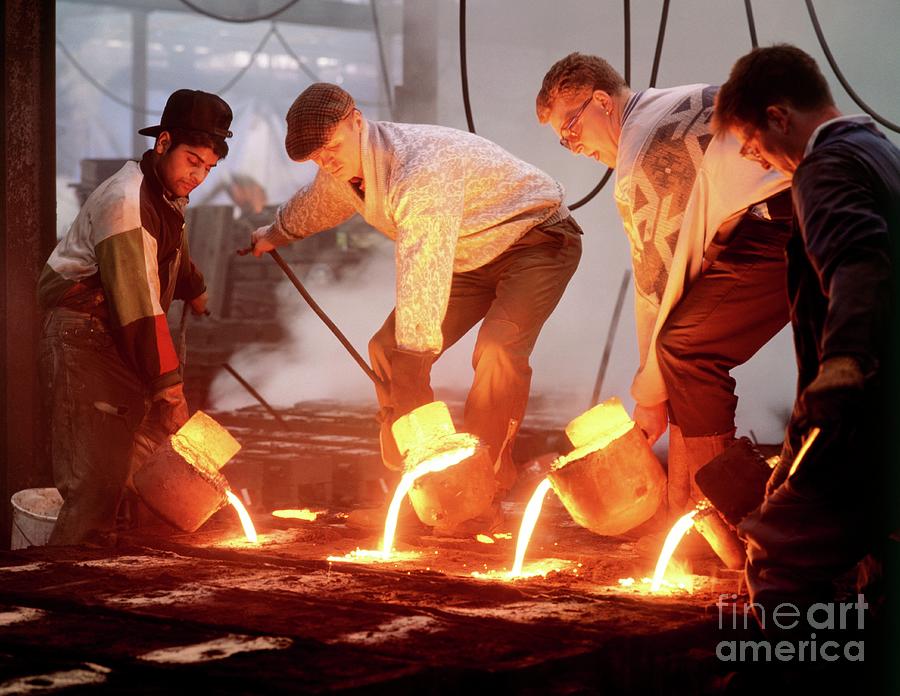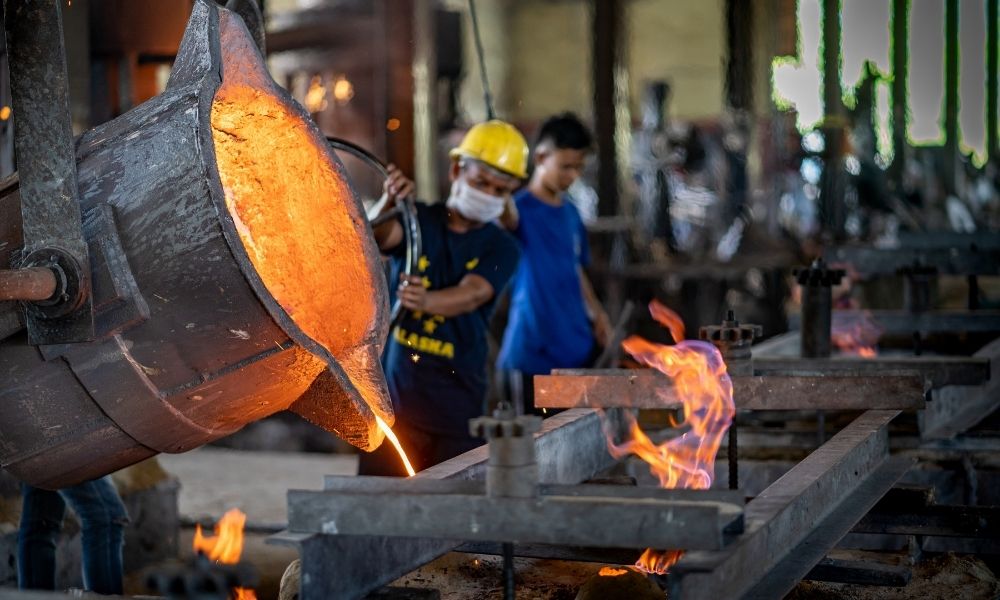Top 10 Aluminum Foundry Applications in Automotive Industries
Wiki Article
A Comprehensive Guide to Metal Casting: Benefits and Services Used by Foundries
Metal casting is an essential process in various sectors, supplying many benefits with the solutions of shops. These centers transform liquified metal right into exact and resilient elements, accommodating specific customer demands. By employing innovative innovations, shops assure high quality and performance in production. Nonetheless, the complexities of metal casting and the varied strategies included raise essential questions regarding its duty in contemporary production. What developments exist in advance in this essential field?Comprehending the Metal Casting Process
The metal casting process is an essential method used in producing to produce intricate forms and components. This method involves pouring molten metal into a mold developed to form the preferred item. The process begins with pattern development, which offers as a theme for the mold and mildew. Metal Foundry. Various materials, such as sand, metal, or ceramic, are used for mold-making, depending on the certain needs of the casting
As soon as the mold is ready, liquified metal is poured into it and enabled to solidify and cool. After solidification, the mold and mildew is gotten rid of, disclosing the cast part. Different methods, consisting of sand casting, financial investment casting, and pass away casting, are used, each matched to various applications and materials. Quality control measures, such as evaluations and testing, are vital to ensure the end product fulfills requirements. On the whole, the metal casting procedure plays a vital duty in generating parts for sectors varying from automotive to aerospace.
Trick Conveniences of Metal Casting
Metal casting supplies significant benefits that make it a preferred manufacturing technique in various industries. Its design flexibility and precision enable intricate forms, while cost-effective mass manufacturing improves efficiency. Additionally, the versatility and strength of products utilized in casting add to the durability of the final items.Layout Flexibility and Accuracy
Launching remarkable style flexibility and accuracy, metal casting permits engineers and designers to develop complex forms and attributes that would be difficult or challenging to accomplish with various other producing approaches. This capacity makes it possible for the manufacturing of complex geometries, interior structures, and fine details that improve item performance and appearances. In addition, various casting techniques, such as sand casting, investment casting, and die casting, give more choices for customization, accommodating varied product homes and task needs. The flexibility of mold and mildews allows modifications during the design phase, improving the change from idea to final product. Eventually, metal casting sticks out for its capability to provide high-precision elements, making it an invaluable procedure in sectors varying from auto to aerospace and beyond.Affordable Mass Manufacturing
Cost-efficient automation stands as one of the key benefits of metal casting, enabling makers to create huge amounts of components at a lower price per device. This efficiency occurs from the ability to produce intricate molds that can be reused multiple times, substantially minimizing arrangement and operational prices. Additionally, metal casting processes, such as sand casting and pass away casting, permit high throughput, making it viable to fulfill the needs of large manufacturing runs. The minimized material waste and energy consumption better boost expense savings, making metal casting an attractive alternative for sectors requiring bulk components. On the whole, the economical nature of metal casting positions it as a preferred method for manufacturers intending for economic efficiency in their manufacturing processes.Product Adaptability and Stamina
One of the standout features of metal casting is its exceptional product adaptability, which permits using a wide variety of alloys and steels. This adaptability enables manufacturers to pick materials that finest match their particular applications, from light weight aluminum and bronze to iron and steel. Each metal provides one-of-a-kind buildings, including differing degrees of strength, rust resistance, and thermal conductivity. Metal casting can generate parts that meet strict performance demands throughout varied industries, such as automotive, aerospace, and building. In addition, the toughness of actors metals can be enhanced with different therapy procedures, ensuring toughness and longevity. Metal Foundry. On the whole, the combination of material versatility and integral strength makes metal casting a preferred selection for generating high-grade componentsKinds Of Metal Casting Techniques
Metal casting includes a range of techniques that cater to various production needs and material homes. Typical methods include sand casting, which utilizes a sand mold and mildew for complicated forms, and financial investment casting, recognized for its precision and surface area finish. Die casting is another strategy that uses high-pressure shot of molten metal right into mold and mildews, perfect for automation of small parts.Shell molding offers a faster alternate, making use of a resin-coated sand to create thin-walled mold and mildews, while shed foam casting allows for intricate layouts without the requirement for a core.
In addition, constant casting is used for creating long areas of metal, such as sheets or bars, by solidifying molten metal in a continual procedure. Each technique is and provides distinct benefits chosen based upon aspects like the required information, production quantity, and material kind, making sure exceptional outcomes in metal construction across different industries.
The Function of Foundries in Metal Casting
Foundries play a crucial function in the metal casting procedure, serving as the centers where molten metal is changed into completed items. These specialized establishments are equipped with the needed devices and innovations to take care of different steels, guaranteeing high-quality results. Foundries are accountable for numerous vital features, including thawing the metal, putting it into mold and mildews, and allowing it to strengthen.Furthermore, they keep strict safety and security and environmental standards to secure employees and reduce eco-friendly impact. Skilled professionals and engineers team up to optimize casting processes, improving performance and reducing waste. Foundries likewise take part in top quality control actions, ensuring that the final products satisfy certain resistances and specifications. This quality control is vital for sectors that count on specific components, such as automotive and aerospace. Consequently, foundries contribute significantly to the total production landscape, making it possible for innovation and growth across various sectors.
Customized Metal Casting Services
Customized metal casting services use tailored style options that fulfill details customer needs. These solutions additionally give material selection experience, making certain the appropriate metal is picked for the wanted application. Such adaptability and expertise boost the total top quality and efficiency of the end product.
Tailored Layout Solutions
Tailored layout services in metal casting give producers with the adaptability to produce parts that meet details performance and visual requirements. Foundries use personalized solutions that allow customers to define measurements, shapes, and surface area finishes to attain desired end results. This customization procedure typically includes cooperation between designers and designers, making sure that the last products line up with functional requirements and sector standards. Advanced innovations, such as computer-aided layout (CAD) and simulation software, make it possible for precise modeling and testing of parts prior to production, boosting and lessening mistakes efficiency. By leveraging customized layout services, organizations can enhance capability while reducing waste and costs, ultimately resulting in a much more one-upmanship out there. This versatility is crucial for sectors calling for one-of-a-kind applications and requirements.Product Option Proficiency
When selecting materials for metal casting, expertise plays an important role in ensuring that the right choice straightens with both efficiency demands and cost-effectiveness. Factories employ experienced professionals who understand the homes of various metals and alloys, permitting them to suggest optimal materials for specific applications. Variables such as stamina, rust resistance, and thermal conductivity are carefully taken into consideration to fulfill the client's needs. In addition, sector trends and innovations in product science educate these choices, enabling shops to stay affordable. By leveraging their know-how, factories can aid clients in guiding with complex material options, eventually leading to boosted product high quality and reduced manufacturing costs. This customized knowledge is crucial for achieving effective outcomes in custom-made metal casting services.High Quality Control in Metal Casting
Quality control in metal casting is critical to guarantee that the last products satisfy the required specs and efficiency standards. Factories use a range of strategies and approaches to guarantee the finest quality of actors components. This process begins with rigid material evaluations, confirming that basic materials abide by market criteria. Throughout the casting process, real-time tracking and screening are carried out to analyze specifications such as temperature, mold honesty, and dimensional accuracy.
Applications of Metal Castings Throughout Industries
Metal castings play a critical function in various markets, acting as the foundation for countless applications. In the automotive market, cast components such as engine blocks and transmission real estates are necessary for automobile performance and dependability. The aerospace sector relies upon accuracy castings for critical elements that ensure security and efficiency in flight. In addition, the building and construction sector makes use of metal castings for components, fittings, and structural elements, boosting the durability of structures and facilities.In addition, the energy market benefits from spreadings used in wind turbine blades and various other tools important for power generation - Aluminum Foundry. The clinical area additionally makes use of metal spreadings in devices and instruments, showing the convenience of this manufacturing process. Overall, metal castings Continue are important to the performance and innovation of varied fields, showcasing their importance in modern technology and infrastructure development
Frequently Asked Questions
What Materials Are Commonly Used in Metal Casting?
Common materials used in metal casting include aluminum, iron, bronze, brass, and steel. Each product supplies one-of-a-kind residential properties appropriate for numerous applications, allowing manufacturers to select the best alternative based upon weight, corrosion, and strength resistance.For how long Does the Metal Casting Process Generally Take?
The metal casting process commonly takes numerous hours to a few days, depending on variables such as the complexity of the design, kind of metal utilized, and the specific casting approach utilized by the foundry.
What Is the Ecological Effect of Metal Casting?
The environmental influence of metal casting includes power usage, emissions, and waste generation. Foundries usually apply procedures to alleviate these effects, such as reusing materials and making use of cleaner technologies to lower their environmental impact.Can Metal Casting Be Done for Small-Scale Projects?
Metal casting can indeed be done for small-scale jobs. Various factories provide to such requirements, offering personalized solutions that fit limited production runs while keeping quality and accuracy in the end products.What Are the Security Measures in Metal Casting Foundries?
In metal casting factories, safety procedures consist of personal safety equipment, appropriate air flow, training on tools use, emergency situation treatments, regular upkeep checks, and adherence to industry security criteria to reduce dangers connected with molten metal and harmful products.Furthermore, metal casting procedures, such as sand casting and die casting, enable for high throughput, making it feasible to meet the needs of massive manufacturing runs. One of the standout qualities of metal casting is its impressive material adaptability, which permits for the use of a large array of metals and alloys. Furthermore, continual casting is made use of for producing long sections of metal, such as bars or sheets, by strengthening liquified metal in a continuous process. Factories play a pivotal function in the metal casting procedure, offering as the centers where liquified metal is transformed into completed products. Usual products made use of in metal casting consist Recommended Reading of aluminum, iron, brass, bronze, and steel.
Report this wiki page